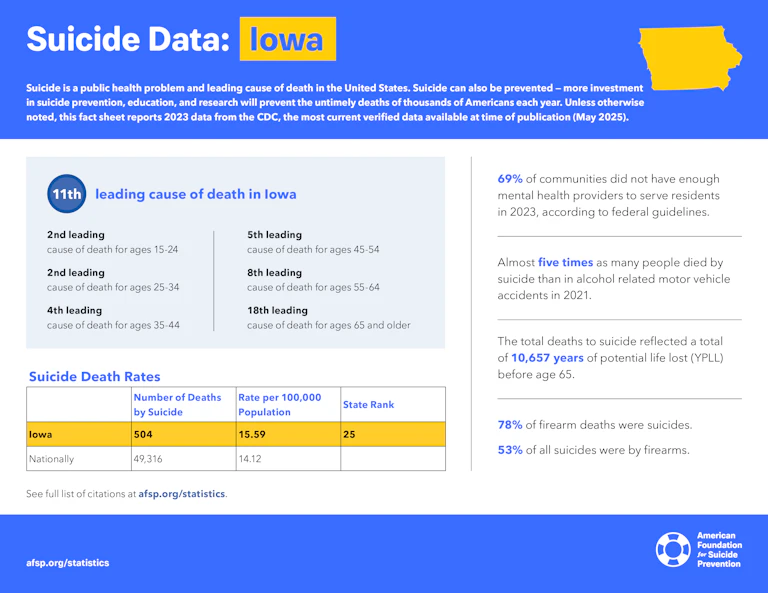Iowa

Iowa suicide prevention plans and initiatives
The Iowa Department of Public Health (IDPH) suicide prevention program works with stakeholders to provide information about signs and symptoms of depression and suicide and develop suicide prevention strategies. IDPH also funds community programs to identify youth who are most at risk for suicide and provide assessment and referral for services. The IDPH Division of Behavioral Health funds the Your Life Iowa program, which provides 24/7 crisis services via phone (855-581-8111), text (855-895-8398), and through the Live Chat feature on their site. The site also includes a depression screening quiz, suicide warning signs, help for family and friends, FAQs about suicide, and tips for practicing self-care. The Iowa Plan for Suicide Prevention: 2022-2027, published in March of 2022, aims to reduce the annual number of deaths through capacity building, the integration of evidence-based, culturally sensitive strategies, and the promotion of community resilience.
Iowa laws
Key:
- Required by law
- Encouraged by law
- No law in place
Crisis lines and 988 implementation
- Addresses 988 infrastructure and provides for telecom user fee
- Addresses 988 infrastructure but does not include telecom user fee
- 988 law limited to creating an exploratory commission, advisory committee, or task force
Mental health parity
- Public health plans (e.g., Medicaid) regularly submit parity compliance analyses to state regulators
- Private health plans (individual and group) regularly submit parity compliance analyses to state regulators
K – 12 school suicide prevention
- Inclusion of the 988 Suicide & Crisis Lifeline and/or other crisis line(s) on student ID cards
- Student allowances for excused mental health absences
- School personnel must report student suicide risk to a parent and/or guardian
- Suicide prevention and/or mental health training for certain school personnel, annual
- Suicide prevention and/or mental health training for certain school personnel, not annual
- Suicide prevention, intervention, and postvention policies/programming
- Student education on suicide prevention
Health professional training in suicide assessment, treatment and management
- Mental health professionals receive regular training
- Mental health professionals receive one time training
- Medical/surgical professionals receive regular training
- Medical/surgical professionals receive one time training
Conversion therapy bans
- Prohibits licensed/board certified mental health providers from engaging in conversion therapy with minors under 18 years of age
- Prohibits licensed/board certified mental health providers from engaging in conversion therapy with vulnerable adults
- Prohibits use of state funds for any purpose related to conversion therapy (e.g., conducting, making a referral for, or extending health benefits coverage for)
University and college campus suicide prevention
- Inclusion of the 988 Suicide & Crisis Lifeline and/or other crisis line(s) on student ID cards
- Students receive information on available mental health and/or suicide prevention services and/or resources
- Adoption of suicide prevention/awareness policy or program
Firearms
- Process for extreme risk protection orders (ERPOs)
- State voluntary do not sell list